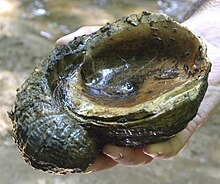| Exogyra Temporal range:
| |
|---|---|

| |
| Exogyra flabellata ( Owl Creek Formation, Late Cretaceous, Mississippi) | |
|
Scientific classification
| |
| Domain: | Eukaryota |
| Kingdom: | Animalia |
| Phylum: | Mollusca |
| Class: | Bivalvia |
| Order: | Ostreida |
| Family: | Gryphaeidae |
| Genus: | †
Exogyra Say, 1820 |
| Species | |
|
See text | |
Exogyra is an extinct genus of fossil marine oysters in the family Gryphaeidae, the foam oysters or honeycomb oysters. [1] These bivalves were cemented by the more cupped left valve. The right valve is flatter, and the beak is curved to one side. Exogyra lived on solid substrates in warm seas[ citation needed] during the Jurassic and Cretaceous periods. [2]
Taxonomy
The former subgenus Exogyra ( Aetostreon) Bayle, 1878, [3] is sometimes considered a separate genus due to a lack of the fine set of parallel ribs (chomata) separated by pits on the inner surface of the valves (which is present in the nominate subgenus). [4]
Species

- Exogyra africana Say, 1820 [5]
- Exogyra aquillana Stephenson, 1953
- Exogyra callophyla Ihering, 1903
- Exogyra cancellata Stephenson, 1914
- Exogyra clarki Shattuck, 1903
- Exogyra columbella Meek, 1876
- Exogyra contorta Eichwald, 1868
- Exogyra costata Say, 1971
- Exogyra davidsoni Whidborne, 1883 [6]
- Exogyra erraticostata Stephenson [7]
- Exogyra fimbriata Conrad, 1855
- Exogyra flabellata (Goldfuss, 1833)
- Exogyra ganhamoroba Maury, 1936
- Exogyra guadalupae Whitney, 1937 (thesis)
- Exogyra haliotoidea Maury, 1936
- Exogyra laevigata J. de C. Sowerby, 1829 [8]
- Exogyra laeviuscula Roemer, 1849
- Exogyra lancha Stoyanow, 1949
- Exogyra levis Stephenson, 1952
- Exogyra mutatoria White, 1887
- Exogyra paupercula Cragin, 1893
- Exogyra plexa Cragin, 1893
- Exogyra potosina Castillo and Aguilera, 1895
- Exogyra ponderosa Roemer, 1852
- Exogyra praevirgula Douville & Jourdy, 1924 [9] [10]
- Exogyra quitmanensis Cragin, 1893
- Exogyra sergipensis Maury, 1936
- Exogyra sigmoidea Reuss, 1844 [11]
- Exogyra solea Muller, 1910
- Exogyra upatoiensis Stephenson, 1914
- Exogyra whitneyi Bose, 1910
- Exogyra woolmani Richards, 1947
Distribution
Fossils of Exogyra have been found in: [2]
- Jurassic
Afghanistan, Chile, China, Eritrea, Ethiopia, France, Germany, India, Kenya, Poland, Portugal, Somalia, Spain, Tanzania, the United Kingdom, and Yemen.
- Cretaceous
Afghanistan, Algeria, Argentina, Brazil, Bolivia, Canada (British Columbia), Bulgaria, Chile, Colombia ( Hiló Formation, Tolima, Macanal and Chipaque Formations, Eastern Ranges), [12] [13] Cuba, the Czech Republic, Egypt, Ethiopia, France, Germany, Greenland, Hungary, India, Iran, Israel, Italy, Jordan, Lebanon, Libya, Madagascar, Mexico, Morocco, Mozambique, New Zealand, Nigeria, Oman, Pakistan, Peru, Poland, Portugal, Serbia and Montenegro, Slovakia, South Africa, Spain, Sweden, Switzerland, Tanzania, Trinidad and Tobago, Tunisia, Turkey, USSR, Ukraine, the United Kingdom, United States (Alabama, Arizona, Arkansas, California, Colorado, Delaware, Georgia, Maryland, Minnesota, Mississippi, Missouri, Montana, New Jersey, New Mexico, North Carolina, Oklahoma, South Carolina, Tennessee, Texas, Utah, Wyoming), Venezuela, and Yemen.
References
- ^ "Evolution of Exogyra plexa". Archived from the original on 26 March 2008. Retrieved 25 March 2008.
- ^ a b Exogyra Archived 13 December 2021 at the Wayback Machine at Fossilworks.org
- ^ "†Exogyra (Aetostreon) Bayle 1878". Paleobiology Database. Fossilworks. Retrieved 17 December 2021.
- ^ Pugaczewska, Halina (1975). "Neocomian oysters from Central Poland" (PDF). Acta Palaeontologica Polonica. 20 (1): 47–72.
- ^ Exogyra africana
- ^ Exogyra davidsoni at Fossilworks.org
- ^ Exogyra
- ^ Lake.P., and Rastall.R.H., (1913), A Text Book of Geology, 2nd edition, London: Edward Arnold's Geological series Page 426 and 436
- ^ Exogyra praevirgula
- ^ Global Names Index
- ^ Ivanov. M., Hrdlickova. S., and Gregorova. R., (2005), The Complete Encyclopedia of Fossils, 3rd. ed., Lisse: Rebo International, page 133
- ^ Piraquive et al., 2011, p. 204
- ^ Acosta & Ulloa, 2002, p. 54
Bibliography
- Acosta, Jorge E., and Carlos E. Ulloa. 2002. Mapa geológico del Departamento de Cundinamarca 1:250,000 - Memoria Explicativa, 1–108. Colombian Geological Survey.
- Piraquive, Alejandro; Juan Sebastián Díaz; Tomas Cuéllar; Germán Pardo, and Andreas Kammer. 2011. Reactivación Neógena de estructuras de rift del Cretácico Temprano asociadas con la Falla de Chámeza, Pajarito, Boyacá (Colombia): evidencias tectónicas y bioestratigráficas. Geología Colombiana 36. 197–216. Accessed 2017-08-04. Archived 30 March 2017 at the Wayback Machine
Further reading
- National Audubon Society Field Guide to North American Fossils
- Gryphaeidae
- Prehistoric bivalve genera
- Jurassic bivalves
- Cretaceous bivalves
- Mesozoic animals of Africa
- Cretaceous Africa
- Mesozoic animals of Asia
- Cretaceous Asia
- Mesozoic animals of Europe
- Cretaceous Europe
- Mesozoic animals of North America
- Cretaceous Canada
- Cretaceous Mexico
- Cretaceous United States
- Mesozoic animals of South America
- Cretaceous Argentina
- Cretaceous Brazil
- Mesozoic Chile
- Cretaceous Colombia
- Cretaceous Peru
- Cretaceous Venezuela
- Jurassic genus first appearances
- Cretaceous extinctions
- Fossils of Serbia
- Fossil taxa described in 1820
- Taxa named by Thomas Say
- Prehistoric bivalve stubs